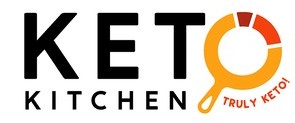2. Only Consume Keto Foods and Ingredients
Keto foods are foods and ingredients that are very low in carbs. What “very low in carbs” means exactly will depend on your daily carb limit.
For example, we recommend keeping total carbs below 35g and net carbs below 25g (ideally, below 20g) so that you can reap the benefits of eating highly satiating foods and ketosis.
(To figure out your net carb consumption, simply subtract total fiber intake from total carbs.)
To have such a small amount of carbs, you must be vigilant about your food choices. You may find that many of your favorite foods will put you near your carbohydrate limit for the day with just one serving.
Even healthier foods like fruits and vegetables are packed with sugar and carbs, but don’t get discouraged — there is plenty of delicious food you can eat on the ketogenic diet.
For example, you can have a keto breakfast recipe drink chocolate for breakfast, a Thai keto diet kale cabbage salad for lunch, and a keto pepperoni pizza Quiche for dinner. All of them are delicious and relatively low in carbs.
Check out this list for some more ideas of what you should and should not eat on the ketogenic diet:
Do Eat
- Meats – fish, beef, lamb, poultry, eggs, etc.
- Low carb vegetables – spinach, kale, broccoli, cauliflower, and other keto-friendly vegetables >
- High-fat dairy – hard cheeses, high fat cream, butter, etc.
- Nuts and seeds – macadamias, walnuts, sunflower seeds, etc.
- Avocado and berries – raspberries, blackberries, and other low glycemic impact berries
- Sweeteners – stevia, erythritol, monk fruit, and other low-carb sweeteners >
- Other fats – coconut oil, high-fat salad dressing, saturated fats, etc.
Do Not Eat
- Tubers – potato, yams, etc.
- Fruit – apples, bananas, oranges, etc.
- Sugar – honey, agave, maple syrup, etc.
- Grains – wheat, corn, rice, cereal, etc.
To see more specific advice on what (and what not) to eat, click here.
However, eating these foods and making these keto recipes will not guarantee you the results you want. Once again, the key to weight loss is eating fewer calories than your body needs to maintain its weight. Even if your diet consists of absolutely no carbs, you can still gain weight. This is why it is so helpful to be aware of how many calories and grams of carbs, fat, and protein you are consuming on a daily basis.
The rest of the text is on the next page




Leave a Comment